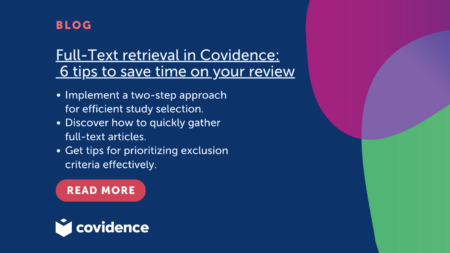Data extraction is the process of obtaining relevant information for analysis, synthesis, or evaluation in your review. By extracting data in a standardized way, the review team can efficiently gather relevant information from all included studies, regardless of their format. .

This is crucial because studies often present data in inconsistent and unstructured ways. Without data extraction, it would be tremendously difficult to analyze the information within each study and synthesize the findings for the review question. The purpose of data extraction is to create a structured template to capture the needed information from the included studies, allowing the review team to effectively analyze and compare data points across all studies.
Even though a common approach to data extraction is the use of a spreadsheet, Covidence offers several features that make data extraction, a critical step in research synthesis, significantly easier and more efficient. Here’s how:
1. Structured Templates: Covidence provides pre-built templates or allows you to create custom ones to fit your specific needs. These templates ensure a logical and well-structured format for data collection, making it easier to find and record relevant information from research papers. Covidence offers two data extraction tools to streamline your review process:
I. Extraction 1 – Ideal for intervention reviews with a standardised PICO(T) structure for ease of meta-analysis. This form is pre-configured to capture key data points relevant to intervention research. You can also adapt it to capture data exactly as reported in the study.
II. Extraction 2– Best suited for non-intervention reviews with a customisable structure. This tool is well-suited for qualitative studies and mixed methods research because it allows you to extract text as well as numerical data. Like Extraction 1, you can customize fields to match the specific data you need for your review question.
2. Flexibility and Customization: You can customize the pre-built templates or (in Extraction 2) build your own from scratch. This allows you to extract only the most relevant data for your research question, saving time and effort. You can also update the extraction template anytime during your review process to reflect new ideas and insights from your research. By standardizing the data collection process and providing pre-built templates, Covidence helps reduce human error and bias in data extraction.
3. Collaboration Features: Covidence allows multiple reviewers to work on data extraction simultaneously. This streamlines the process and facilitates teamwork. More so, you can easily export your extracted data into various formats, including Excel, and CSV, for further analysis and reporting. In Extraction 1, Covidence’s export to RevMan function streamlines the transfer of data for meta-analysis, saving researchers time and reducing potential errors.

4. Overall improved user experience: In extraction 1, Covidence automatically saves your data extraction progress, eliminating the risk of losing your work in case of technical issues. Also, Covidence now offers a more user-friendly PDF viewer in data extraction which allows you to:
i. Zoom in and out for better readability of text, figures, and tables.
ii. Seamlessly copy and paste content from the PDF directly into your data extraction forms, saving time.
iii. Search within the PDF for specific terms to locate relevant information quickly.
iv. Rotate the document for optimal viewing, especially with sideways formatted PDFs.
v. Access helpful tooltips by clicking the question mark icon next to each data extraction field for quick guidance.
Covidence offers a suite of features that streamlines and simplifies data extraction, a vital step in conducting systematic reviews. With its structured templates, customizable options, collaboration features, and improved user experience, Covidence empowers researchers to efficiently gather relevant information and minimize errors, ultimately facilitating a more robust and reliable review process.
Our support team is available via support@covidence.org to answer any of your queries within 24 hours.
Happy reviewing!



